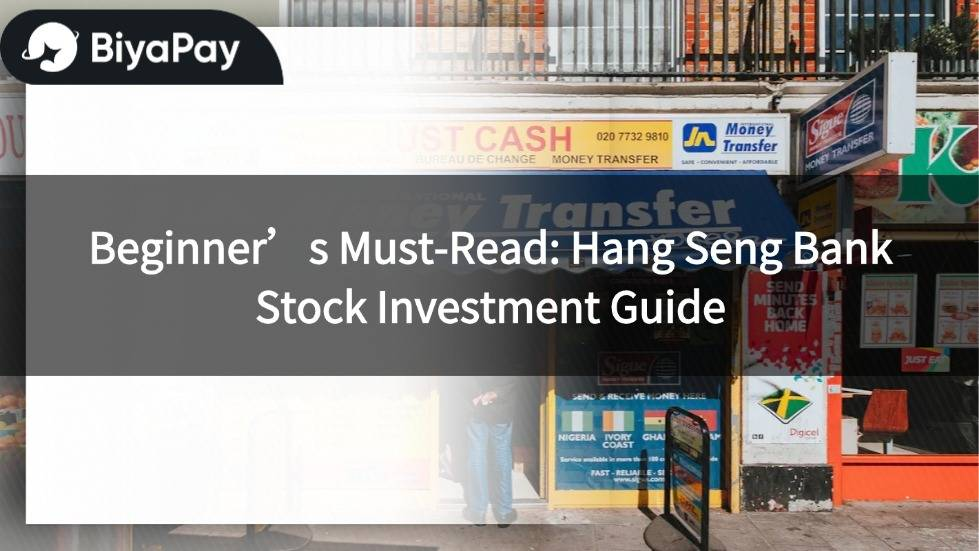- EasyCard
- Trade
- Help
- Announcement
- Academy
- SWIFT Code
- Iban Number
- Referral
- Customer Service
- Blog
- Creator
Beginner’s Must-Read: Hang Seng Bank Stock Investment Guide

Image Source: pexels
To start trading Hang Seng Bank stocks, you need to understand the basic steps first. Firstly, opening a securities account is a necessary condition. Most Hong Kong banks, such as Hang Seng Bank, will require you to provide valid identification and proof of address. These documents help the bank verify your identity and ensure transaction security.
Secondly, preparation before investing is crucial. You should review your financial situation and use tools like backtesting software to analyze the feasibility of your strategy. By studying historical data, you can understand how Hang Seng Bank’s stock price performs under different market conditions, enabling you to make more informed investment decisions.
Basic Knowledge of Hang Seng Bank Stocks

Image Source: pexels
Characteristics of Hang Seng Bank Stocks
Hang Seng Bank stocks are considered blue-chip stocks, meaning they offer stable returns and lower risks. As one of Hong Kong’s leading banks, Hang Seng Bank’s operations cover retail banking, commercial banking, and wealth management, among other areas. This diversified business model provides a stable foundation for the stock.
You will find that Hang Seng Bank stocks have a relatively high dividend payout ratio, attracting many investors seeking stable returns. Additionally, the stock has strong liquidity and active market trading, making it convenient for you to buy or sell at any time. These characteristics make Hang Seng Bank stocks an ideal choice for beginner investors.
Tip: Understanding the characteristics of a stock before investing helps you assess whether it aligns with your investment goals.
Hang Seng Bank Stock Price and Market Position
Hang Seng Bank’s stock price holds a significant position in the Hong Kong stock market. As a constituent of the Hang Seng Index, the stock’s performance directly affects the index’s movements. By observing changes in Hang Seng Bank’s stock price, you can gauge the market’s confidence in the banking sector.
Hang Seng Bank enjoys a solid market position with a broad customer base and strong brand influence. These factors make its stock price relatively stable during market fluctuations. According to historical data, Hang Seng Bank’s stock price generally rises with economic growth but may also be affected by changes in interest rates and policy adjustments.
Stock Code and Inquiry Methods
Hang Seng Bank’s stock code is 00011. This is critical information you need when trading. You can check relevant information through the official website of the Hong Kong Stock Exchange or your brokerage platform.
When inquiring, it’s advisable to pay attention to real-time stock prices, trading volume, and historical trends. These data can help you determine the timing for buying or selling. If you use a mobile app, you can also set price alerts to stay updated on changes in Hang Seng Bank’s stock price.
Tip: Familiarizing yourself with the stock code and inquiry methods can make your investment operations more efficient.
Steps for Buying and Selling Stocks
Process of Opening a Securities Account
To start investing in stocks, the first step is to open a securities account. You can choose to open an account with a Hong Kong bank or a professional brokerage. The general process is as follows:
- Prepare Documents: You need to provide valid identification (e.g., Hong Kong ID card) and proof of address (e.g., utility bill or bank statement from the past three months).
- Choose Account Type: Based on your investment needs, select a cash account or a margin account. Cash accounts are suitable for beginners due to lower risks, while margin accounts are better for experienced investors.
- Submit Application: Fill out the account opening form and submit the required documents. Some banks or brokerages offer online application services for added convenience.
- Deposit Funds: After successfully opening the account, you need to deposit funds into the securities account to start trading.
Tip: When choosing a brokerage, pay attention to related fees, such as account opening fees and minimum deposit requirements, which may vary by brokerage.
Choosing a Suitable Brokerage
Selecting a brokerage is a critical step in stock investing. A suitable brokerage can provide a stable trading platform and professional support. Here are some factors to consider when choosing a brokerage:
- Trading Fees: Compare commissions and other fees across different brokerages. Lower fees can help reduce your investment costs.
- Trading Platform: Ensure the platform is user-friendly and offers real-time Hang Seng Bank stock price inquiries.
- Customer Service: Choose a brokerage with 24-hour support to assist you when needed.
- Additional Features: Some brokerages provide technical analysis tools and market reports to help you develop better investment strategies.
Tip: Diversifying risks is key to successful investing. Avoid putting all your funds into a single brokerage to reduce systemic risks.
Basic Operations for Buying Stocks
After opening an account, you can start buying stocks. Here are the basic steps:
- Select Stocks: Based on market analysis and personal goals, choose suitable stocks, such as Hang Seng Bank stocks.
- Set Price: Enter the stock code (e.g., 00011 for Hang Seng Bank) on the trading platform and set the purchase price. You can choose a market order or a limit order.
- Confirm Transaction: Review the order details, confirm they are correct, and submit. You will receive a confirmation notice once the transaction is completed.
- Monitor Stock Price: After holding the stock, regularly check changes in Hang Seng Bank’s stock price and adjust your strategy based on market conditions.
Tip: Identifying major players’ movements and confirming price breakouts are key to successful trading. Observing large orders and changes in trading volume can help you predict short-term trends.
Additionally, historical backtesting is an important tool for validating investment strategies. Through data testing, you can better understand the characteristics of your strategy, avoid relying on intuition, and improve your success rate.
Basic Operations for Selling Stocks
Selling stocks is an important part of the investment process. When you decide to sell Hang Seng Bank stocks, consider market conditions and your personal investment goals. Here are the basic steps to help you complete the transaction smoothly.
- Evaluate Selling Timing
Observe market trends and changes in Hang Seng Bank’s stock price. When the stock price reaches your target price or the market experiences significant fluctuations, it may be a good time to sell. You can also refer to technical indicators, such as moving averages or the Relative Strength Index (RSI), to determine whether to sell. - Set Selling Price
Enter Hang Seng Bank’s stock code (00011) on the trading platform and set the selling price. You can choose a market order or a limit order. Market orders can complete the transaction quickly but may have price fluctuations; limit orders ensure selling at your set price or higher but may require a longer wait. - Confirm Transaction
Before submitting the order, carefully review all details, including the number of shares and price. Submit the order once confirmed. After the transaction is completed, you will receive a notification and can view details in your transaction records. - Check Trading Volume
Trading volume is an important indicator for assessing liquidity risk. Low trading volume may make it difficult to sell stocks smoothly or force you to sell at an unfavorable price. For example, if a stock’s average daily trading volume is below 1 million, you should pay special attention to liquidity risks. Hang Seng Bank stocks typically have high trading volume, but you should still check the latest data before trading.
Tip: When selling stocks, avoid making impulsive decisions due to emotional fluctuations. Stay calm and act based on data and strategy.
Post-Sale Considerations
After completing the sale, check your securities account balance to ensure the funds have been deposited successfully. You can also record the profit or loss from this transaction for future reference. Additionally, periodically review your investment portfolio to ensure your asset allocation aligns with your long-term goals.
Tip: By analyzing past transaction records, you can better understand your investment patterns and optimize future strategies.
Selling stocks is not just a simple operation but a part of your investment strategy. Mastering proper selling techniques can help you achieve better returns in the market.
Investment Strategies and Risk Management

Image Source: pexels
Pros and Cons of Long-Term Investing vs. Short-Term Trading
When investing in Hang Seng Bank stocks, you need to choose a strategy that suits you. Long-term investing and short-term trading each have their pros and cons, depending on your goals and risk tolerance.
Long-term investing is suitable for investors seeking stable returns. By holding Hang Seng Bank stocks for years, you can enjoy dividend income and capital appreciation. This strategy’s advantages include lower trading frequency, reduced fees, and less stress from short-term market fluctuations. However, long-term investing requires patience and carries the risk of prolonged market downturns.
Short-term trading suits investors aiming for quick profits. You can capitalize on short-term fluctuations in Hang Seng Bank’s stock price by frequently buying and selling to earn price differences. This strategy’s advantages include fast capital turnover and the ability to seize short-term market opportunities. However, short-term trading demands more time and energy, incurs higher fees and taxes, and carries greater risks.
Tip: If you’re a beginner, start with long-term investing, as it has lower risks and helps you build stable investment habits.
Analyzing Hang Seng Bank’s Financial Statements
Before investing, learning to analyze financial statements is key. Hang Seng Bank’s financial statements include the balance sheet, income statement, and cash flow statement. These documents help you understand the company’s financial health.
- Balance Sheet: Check the ratio of Hang Seng Bank’s assets to liabilities. A high debt-to-asset ratio may indicate excessive debt and higher risks.
- Income Statement: Focus on trends in revenue and net profit growth. Stable revenue growth suggests strong business performance.
- Cash Flow Statement: Ensure the company has stable cash inflows. Sufficient cash flow supports daily operations and future development.
By analyzing these data, you can more comprehensively assess Hang Seng Bank’s investment value. Remember to regularly review the latest financial statements, as market conditions and company operations may change at any time.
Tip: When analyzing financial statements, pay attention to Hang Seng Bank’s dividend payout ratio, a key indicator of stable returns.
Methods for Judging Market Trends
Judging market trends is the foundation of successful investing. You can improve accuracy with the following methods:
- Establish a robust data collection and cleaning process: Collect market data from multiple sources and standardize it. This ensures data accuracy and provides a reliable basis for your analysis.
- Choose the right model based on prediction goals: Different market conditions require different analytical tools. For example, technical analysis is suitable for short-term trend predictions, while fundamental analysis is better for long-term investing.
- Integrate prediction results with investment strategies: Translate market trend predictions into specific investment actions. Regularly evaluate your strategy to ensure it aligns with market changes.
Additionally, observing Hang Seng Bank’s historical stock price trends can provide reference points. By analyzing past price fluctuations, you can gauge market confidence in the banking sector and predict future trends.
Tip: Using technical indicators (e.g., moving averages) to assist in trend judgment can help you time buys and sells more accurately.
Risk Management Techniques
When investing in Hang Seng Bank stocks, risk management is essential. Even stable blue-chip stocks can incur losses due to market fluctuations or external factors. Here are practical risk management techniques to help protect your funds during the investment process.
1. Set Stop-Loss Points
A stop-loss point is a tool investors use to limit losses. When Hang Seng Bank’s stock price falls to your set price, the system automatically sells the stock to prevent further losses. For example, if you buy Hang Seng Bank stock at USD 150 per share, you can set a stop-loss point at USD 135. If the price falls below this level, the system will execute a sell order.
Tip: Set stop-loss points based on your risk tolerance. Setting it too close to the purchase price may lead to frequent sales, while setting it too loosely may fail to control losses effectively.
2. Diversify Investments
Spreading your funds across different stocks or asset classes can reduce risks from a single stock’s fluctuations. For example, in addition to Hang Seng Bank stocks, you can consider investing in other Hong Kong bank stocks or international ETFs (exchange-traded funds). This way, even if one investment underperforms, gains from others may offset losses.
| Asset Class | Advantages | Risks |
|---|---|---|
| Blue-Chip Stocks | Stable returns, high dividends | Market fluctuations may affect prices |
| ETFs | Diversified risks, low management fees | Affected by overall market performance |
| Bonds | Low risk, stable returns | Yields typically lower than stocks |
Suggestion: When diversifying, ensure your asset allocation aligns with your investment goals and risk preferences.
3. Regularly Review Your Portfolio
Market conditions and company operations may change at any time. Regularly reviewing your portfolio helps you adjust strategies promptly. For example, if Hang Seng Bank’s financial performance declines or market interest rates rise, you may need to reassess whether to continue holding the stock.
Note: When reviewing your portfolio, focus on Hang Seng Bank’s latest financial statements and market trends to ensure your decisions are based on current data.
4. Control Leverage Ratios
Using leverage can amplify returns but also increases risks. If you trade with a margin account, control the leverage ratio to avoid significant losses due to market fluctuations. For example, keeping the leverage ratio at 1:2 or lower can effectively reduce risks.
Warning: High leverage can lead to rapid capital loss, especially during volatile markets. Beginner investors should use leverage cautiously.
5. Stay Calm and Avoid Emotional Trading
Market fluctuations may trigger panic or greed, leading to irrational investment decisions. When Hang Seng Bank’s stock price suddenly drops, stay calm and act based on data and strategy, not emotions.
Tip: Create a clear investment plan and strictly follow it to remain rational during market fluctuations.
6. Build an Emergency Fund
When investing in stocks, ensure you have sufficient emergency funds to handle unexpected situations. This fund should cover at least 3 to 6 months of living expenses to avoid financial strain from investment losses.
Suggestion: Keep emergency funds in highly liquid assets, such as savings accounts or money market funds, for easy access.
Summary
Risk management is the cornerstone of successful investing. By setting stop-loss points, diversifying investments, regularly reviewing your portfolio, controlling leverage ratios, and staying calm, you can effectively reduce risks when investing in Hang Seng Bank stocks. Additionally, building an emergency fund further ensures your financial security. Remember, robust risk management helps you stand firm in the market.
When investing in Hang Seng Bank stocks, you should master the following key points:
- High customer satisfaction reflects stable service quality and brand reputation.
- Improved employee satisfaction enhances operational efficiency, ensuring steady company growth.
- Continuous product innovation strengthens competitiveness, attracting more market share.
Rational investing is crucial. Avoid emotional decisions and focus on data analysis and long-term goals. You should also keep learning, stay updated on market changes, and enhance your investment skills. A steady strategy and knowledge accumulation can help you succeed in the stock market.
FAQ
1. How can I check the real-time price of Hang Seng Bank stocks?
You can use the official website of the Hong Kong Stock Exchange or your brokerage’s trading platform to check real-time prices. Enter Hang Seng Bank’s stock code “00011” to view the latest price, trading volume, and other relevant data.
Tip: Set price alerts to stay informed about price changes.
2. How much capital is needed to invest in Hang Seng Bank stocks?
The required capital depends on the stock price and the number of shares you purchase. For example, if Hang Seng Bank’s stock price is USD 150 and one lot is 100 shares, you need at least USD 15,000 plus trading fees.
Suggestion: Ensure you have extra funds to cover commissions and other fees.
3. How is the dividend for Hang Seng Bank stocks calculated?
Dividends are calculated based on the per-share payout amount. For example, if the dividend is USD 5 per share and you hold 100 shares, you will receive USD 500. Dividends are typically paid annually or semi-annually.
Note: Dividend amounts may vary based on company performance.
4. Should beginners choose a cash account or a margin account?
Beginners should choose a cash account. Cash accounts have lower risks and are suitable for novices. Margin accounts can amplify returns but carry higher risks and require caution.
Warning: Avoid using high leverage, especially during market volatility.
5. What are the risks of investing in Hang Seng Bank stocks?
Main risks include market fluctuations, interest rate changes, and policy adjustments. Even as a blue-chip stock, Hang Seng Bank may experience price declines due to external factors.
- Market Fluctuations: Short-term price changes.
- Policy Impacts: Changes in government policies.
Tip: Diversifying investments can effectively reduce risks.
Investing in Hang Seng Bank stock offers new investors a stable blue-chip option, with long-term strategies and risk management enabling steady dividend yields and capital growth. However, efficient cross-border investing and fund management are equally critical. BiyaPay provides a seamless digital financial platform, allowing trading in U.S. and Hong Kong stocks, including Hang Seng Bank, without offshore accounts.
Supporting USD, HKD, and 30+ fiat and digital currencies with real-time exchange rate transparency, plus global remittances to 190+ countries with remittance fees as low as 0.5%, it significantly reduces traditional banking costs. A 5.48% annualized yield savings product with no lock-in period complements Hang Seng Bank’s stable returns, ensuring liquidity and wealth growth. Sign up for BiyaPay today to pair Hang Seng Bank stock investments with BiyaPay’s digital financial tools for efficient, cost-effective wealth management!
*This article is provided for general information purposes and does not constitute legal, tax or other professional advice from BiyaPay or its subsidiaries and its affiliates, and it is not intended as a substitute for obtaining advice from a financial advisor or any other professional.
We make no representations, warranties or warranties, express or implied, as to the accuracy, completeness or timeliness of the contents of this publication.




Contact Us
Company and Team
BiyaPay Products
Customer Services
is a broker-dealer registered with the U.S. Securities and Exchange Commission (SEC) (No.: 802-127417), member of the Financial Industry Regulatory Authority (FINRA) (CRD: 325027), member of the Securities Investor Protection Corporation (SIPC), and regulated by FINRA and SEC.
registered with the US Financial Crimes Enforcement Network (FinCEN), as a Money Services Business (MSB), registration number: 31000218637349, and regulated by FinCEN.
registered as Financial Service Provider (FSP number: FSP1007221) in New Zealand, and is a member of the Financial Dispute Resolution Scheme, a New Zealand independent dispute resolution service provider.




















